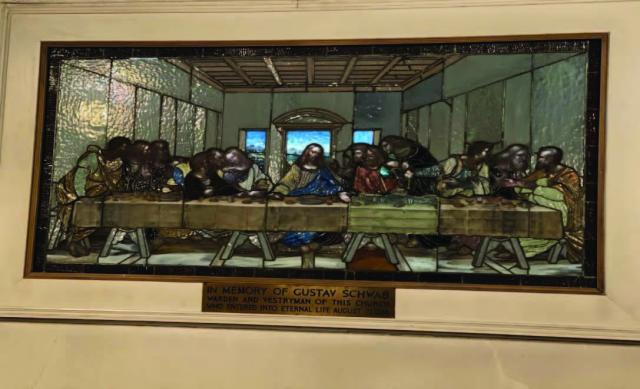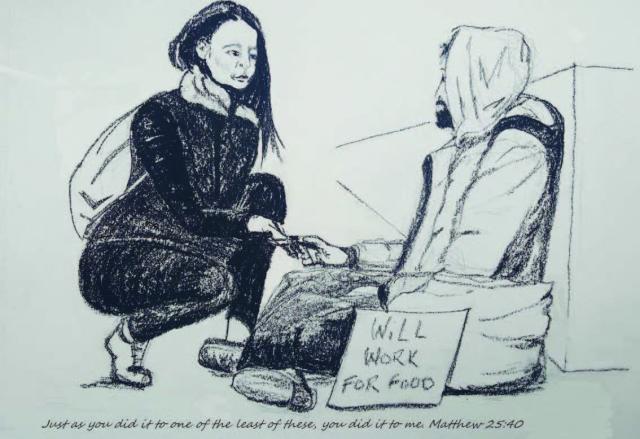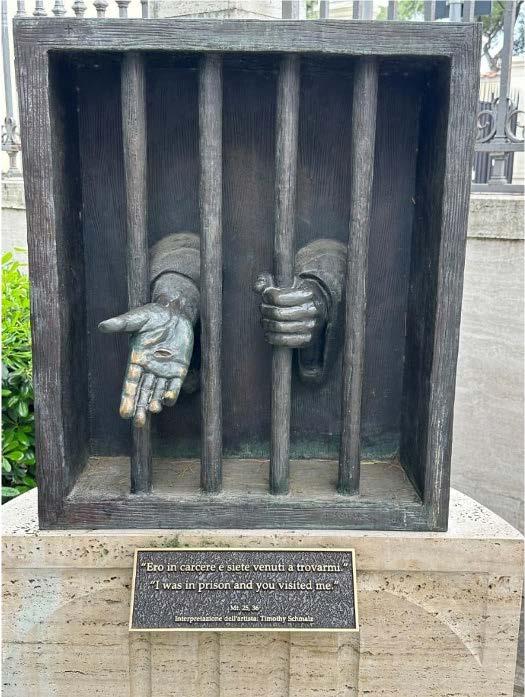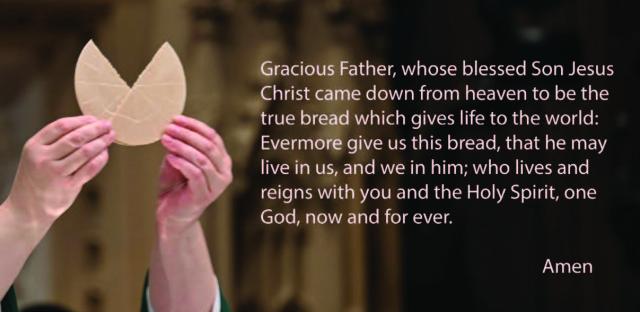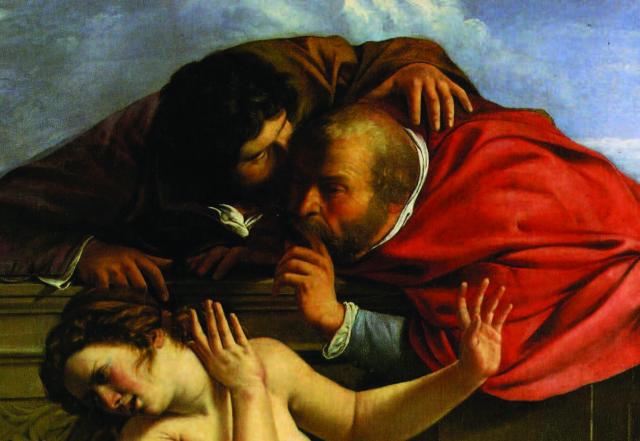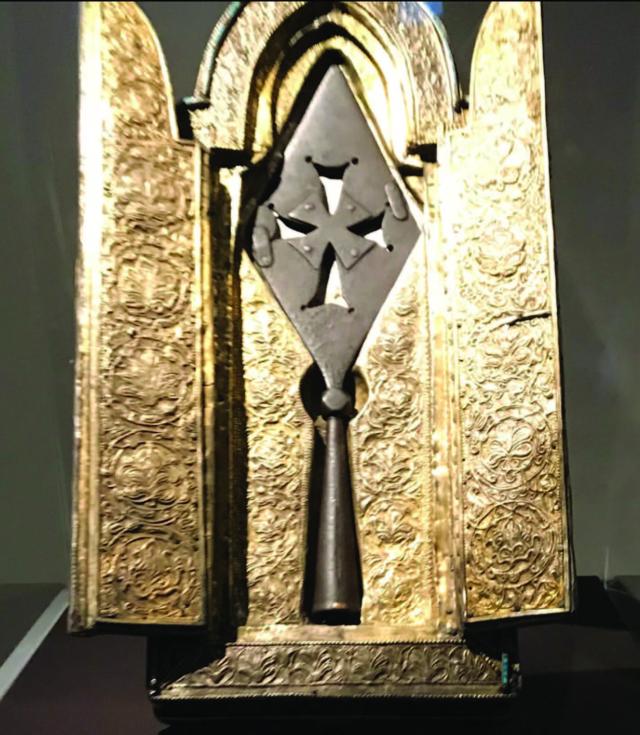Lenten Meditations 2024

I invite you, therefore, in the name of the Church, to the observance of a holy Lent, by self-examination and repentance; by prayer, fasting, and self-denial; and by reading and meditating on God’s holy Word. And, to make a right beginning of repentance, and as a mark of our mortal nature, let us now kneel before the Lord, our maker and redeemer.
By the cross and passion of your Son our Lord,
Bring us with all your saints to the joy of his resurrection.
—The Book of Common Prayer, 1979
These Lenten Meditations were prepared by the worshiping community, clergy, and staff of Trinity Church Wall Street to offer reflection and inspiration throughout this holy season. Provided by the Congregational Council, they were produced by congregational volunteers, the Faith Formation and Education Department, and the Communications Department, who express gratitude to all who contributed to this collection and to all who are blessed by it.
Ash Wednesday, February 14, 2024
Joel 2:1–2,12–17 or Isaiah 58:1–12; 2 Corinthians 5:20b–6:10; Matthew 6:1–6,16–21; Psalm 103 or 103:8–14
“Almighty and everlasting God, you hate nothing you have made[.]” We can imagine that our conversation to the Way depends on adopting ascetical disciplines to appease a wrathful God. This may lead to loading up our Lent with burdensome practices—a path to dejection when we fail to keep them or else pride in our own willpower that puts more distance between us and God. But as the Rule of Benedict reminds us, the spiritual path requires “nothing harsh, nothing burdensome.”
Jesus teaches us the pillars of Lenten practice: unselfconscious almsgiving, prayer so honest that God alone can perceive it, and fasting that creates space for God’s joy to fill our being. Each pillar’s construction can start with one strike at the stone of our hearts: a dollar or a few minutes of service given in love, a prayer of genuine gratitude, dialing back an indulgence that has begun to crowd out space in the soul that should belong to Christ. We do not need to compete in an “Asceticism Olympics” to observe a holy Lent. We just need to take one step toward God in love and trust, allowing the Spirit to draw us the rest of the way.
Daniel Weick
Thursday after Ash Wednesday, February 15, 2024
Deuteronomy 30:15–20; Psalm 1; Luke 9:18–25
The Deuteronomist today illuminates consequences of living faithfully or serving other gods: The Israelites can choose between life/blessings and death/curses as they enter the land they believe God promised. We can think of Moses offering us the same alternatives: walking the Divine path and prospering like a fruit-bearing tree next to water as the Psalmist says, or in the counsel of the wicked, led astray to serve idols—like chaff that the wind blows away.
Lent is a good time for me to take stock of what in my life doesn’t look like love. I consider things I think, do, or not do—are they nurturing/kind or are they self-serving? I wonder how I might be more hospitable to others and how my heart might be more hospitable for Holy to dwell. I remember today’s Gospel that teaches us to love others: whoever wants to save their life will lose it while whoever wants to lose their life for Jesus’s sake will save it and gain the whole world. I imagine what it might look like for me to spend my life serving in Jesus’s way: How will my prayers feel, and how will I use my skills to meet community needs?
Joy Jauer
Friday after Ash Wednesday, February 16, 2024
Isaiah 58:1–9a; Psalm 51:1–10; Matthew 9:10–17
Psalm 51, “Miserere me, Deus,” is steeped in legend. Parts may originate from ancient Egyptian funerary texts, preparing the dead for rebirth into the afterlife. Tradition holds that David wrote the psalm in deep contrition for the murder of Uriah.
Two millennia later, the Miserere became popular in Catholic liturgical music. One version was performed exclusively in the Sistine Chapel during Tenebrae, and the pope forbade transcription of the piece on penalty of death. The story goes that young Mozart heard a performance, transcribed the score from memory, and shared it—escaping the pope’s wrath because of musical genius. The version often heard today, with soaring high solo, is the result of a later transcription error.
Through many centuries and generations, the words of Psalm 51 resonate even as form and delivery metamorphose. Each iteration a new wine in a new wineskin, a fresh glimpse into the infinite mercy and compassion of God. When we listen, we can hear of joy and gladness, and our broken bodies rejoice, knowing that we also can transform. With God’s help, our light will break forth like the dawn, and when we lift up our voices, the Lord will say, “Here I am.”
Jonah Schrowang
Saturday after Ash Wednesday, February 17, 2024
Isaiah 58:9b–14; Psalm 86:1–11; Luke 5:27–32
Grace
Jesus saw the heart of Levi and called him.
“Follow me.”
“And he got up, left everything, and followed him.”
What went through Levi’s mind in that instant—between “Follow me” and getting up? There is hardly a beat of hesitation. Was he surprised? Didn’t he have to think things through first? Perhaps Levi was waiting for this his whole life; for someone to see him, really see him, find him worthy, and love him. Unconditional, unearned love.
O Divine Physician, who befriends sinners and calls us acceptable, lovable, and wonderful, aid us when we, like Levi, hear the call to follow without missing a beat. Heal our minds’ blindness. Make the ears of our hearts perceptive to jump up at your word and invite you in. In the name of Jesus, the one who beckons and delights to sit with us at table.
Beth Johanning
Sunday in the First Week of Lent, February 18, 2024
Genesis 9:8–17; 1 Peter 3:18–22; Mark 1:9–15; Psalm 25:1–9
Anonymous
Monday in the First Week of Lent, February 19, 2024
Leviticus 19:1–2,11–18; Psalm 19:7–14; Matthew 25:31–46
Pat Hreljanovic
Tuesday in the First Week of Lent, February 20, 2024
Isaiah 55:6–11; Psalm 34:15–22; Matthew 6:7–15
Lenten Thoughts
Isaiah: 55:6
“Seek the Lord while He may be found ...”
A Lenten Voice. He will help us listen as we seek the Lord within us, others and the world. He speaks to us in the quiet and the noise, the birds and trees—wherever He is.
Psalm 34: 18
“The Lord is near to the brokenhearted and saves the crushed in spirit.”
May we see the brokenhearted and crushed in spirit in our midst and bring them Your comfort, Word and Love, through oneness of heart.
Matthew 6:10
“Your kingdom come. Your will be done, on earth as it is in heaven.”
As we walk with You this Lent, on Your final earthly journey fulfilling Your Father’s will for us, for all people for all time, can I/we help carry Your cross, wipe Your brow or give You cool water to drink and ease Your way? You ARE the WAY! We are here now and can do so with those who we know, share a seat in the pew or may never know. You are the eternal spiritual light guiding us to You through guiding us to those in need. Thank you, Lord.
Catherine Skopic
Wednesday in the First Week of Lent, February 21, 2024
Jonah 3:1–10; Luke 11:29–32; Psalm 51:11–18
Prayer from the New Zealand Prayer Book,
He Karakia Mihinare o Aotearoa:
Lord,
It is night.
The night is for stillness.
Let us be still in the presence of God.
It is night after a long day.
What has been done has been done;
what has not been done has not been done;
let it be.
The night is dark.
Let our fears of the darkness of the world and of our own lives rest in you.
The night is quiet.
Let the quietness of your peace enfold us,
all dear to us,
and all who have no peace.
The night heralds the dawn.
Let us look expectantly to a new day,
new joys, new possibilities.
In your name we pray.
Amen.
Gerhard Van Der Poel
Thursday in the First Week of Lent, February 22, 2024
Esther (Apocrypha) 14:1–6, 12–14; Psalm 138; Matthew 7:7–12
Living Purposefully
The Bible is replete with examples of individuals whose actions are worthy of emulation, as well as those whose actions are considered reprehensible. Both the Old and the New Testaments highlight examples of morally upright behavior as part of a broader personal and corporate mission that glorifies the Lord’s word.
When Deborah—a judge in the Old Testament—leads Israelites to victory against the Canaanites, she does so after overcoming Barak’s hesitation (Judges 4:4–14). Her honest admission that general Barak will share the laurels of victory over Sisera with another woman is a prophesy that breaks with normative expectations of battlefield honor being credited to men. Deborah’s battlefield glory shines through her enduring dedication to dispensing justice without fear or favor (Judges 4:4–5).
In the parable of the prodigal son (Luke 15:11–32), the father is a personification of heavenly grace and forgiveness. But the father also epitomizes a lifetime of loving and unconditional love for his children. Forgiveness finds its true meaning in the backdrop of unconditional love.
This day in Lent reminds me about the importance of following a purpose grounded in all virtues of the Bible, not just the ones I find easier to follow in the moment.
Samit Ahlawat
Friday in the First Week of Lent, February 23, 2024
Ezekiel 18:21–28; Psalm 130; Matthew 5:20–26
What is fair? Maybe it is because I am a Libra that I spend a considerable amount of time thinking about fairness and justice, and I find myself weighing issues and contextualizing people in their totality. In doing so, it seems impossible for me not to dredge up the past. However, the readings today remind me that God relates to us only in the present and gives us a clean slate each day. He does not hold our pasts against us or remember whether we have been good or bad. What matters is who we are right in this moment and the choices we are actively making.
The Christian life is one of work that is never complete. We are told to continually work on improving ourselves, not for the optics of others, but for our own integrity. Because we live in community with one another, we owe each other the extension of grace, just as God has granted us the most consequential gift of forgiveness, allowing us to ultimately be redeemed. So my question to myself is not “What is fair?” but rather “How do I keep myself accountable to God’s righteousness?”
Alan Baker Yu
Saturday in the First Week of Lent, February 24, 2024
Acts 1:15–26; Philippians 3:13–21; John 15:1, 6–16; Psalm 15
Find a loving, kind friend
and your joy will spill over.
Share heart truth, with any expectations kept in check,
and your connection to humanity
lives in care and blessing.
Matthias, gift of God,
was a loving follower of Jesus.
He served, he believed, he was humble with what he was given.
Faith and humility prevail,
although this may seem like a powerless seat.
But it is good, unconditional.
Love God and each other this way,
no fear, have trust, we hope.
Recognize yourself and you won’t ache for love.
Give kindness, some silence, and satisfaction with
who you are in God’s eyes.
Cindy Jay
Sunday in the Second Week of Lent, February 25, 2024
Genesis 17:1–7, 15–16; Romans 4:13–25; Mark 8:31–38; Psalm 22:22–30
Choices
Baptisms are now typically followed by a celebratory meal or party. It is an uplifting occasion, honoring a happy milestone in one’s life. In last week’s readings, however, after God declares Jesus God’s “beloved Son,” other baptismal implications become clear. Rather than a party, Jesus is driven into the desert and tempted by the devil for 40 days.
Our Gospel today shows other implications of being baptized.
Uniting our lives to Christ requires us to make many choices, living sacrificial lives of love and service. Living into the ministry set before him, Jesus discusses the ultimate sacrifice before him, when he will lay down his life for us.
We too are called to live a ministry of love and to take up our own crosses. The choices are sometimes hard to make. Sometimes, it is easier to succumb to temptation or intransigence. Sometimes we listen to other voices that may lead us astray, rather than to God’s.
The implications Jesus describes are dire: life itself. Thus, we pray in the Lord’s prayer, “Deliver us from evil” and “Save us from the time of trial.”
May we be given the strength and blessing to accept the life of love promised to us in baptism and make faithful and life-affirming choices to live into our vows.
Emory Edwards
Monday in the Second Week of Lent, February 26, 2024
Daniel 9:3–10; Psalm 79:1–9; Luke 6:27–38
Mike Castellon
Tuesday in the Second Week of Lent, February 27, 2024
Isaiah 1:2–4, 16–20; Psalm 50:7–15, 22–24; Matthew 23:1–12
The greatest among you will be your servant. All who exalt themselves will be humbled, and all who humble themselves will be exalted. —Matthew 23:11–12 NRSV
What is my rightful place before God? Whether humbled or exalted, I am beloved of God and called to choose God first, in all things. In the practice of humility, discipleship teaches wisdom.
Dr. Kathy Bozzuti-Jones
Wednesday in the Second Week of Lent, February 28, 2024
Jeremiah 18:1–11, 18–20; Psalm 31:9–16; Matthew 20:17–28
Kaylin Loewe
Thursday in the Second Week of Lent, February 29, 2024
Jeremiah 17:5–10; Psalm 1; Luke 16:19–31
The Collect for today offers clear instructions for our Lenten practice. It focuses on the whole person: heart, mind, and behavior. It reads in part, “Cleanse our hearts from sin, keep our hands pure, turn our minds from what is passing away.” Cleanse, keep, turn. Heart, hands, mind.
These instructions-in-a-prayer echo Jeremiah’s message from the Lord. The Lord “tests the mind” and “searches the heart” to “give to all according to the fruit of their doings.”
Our Lenten practice can involve our whole being: body, mind, and heart as we pray that our hearts be cleansed from sin, our hands—the “fruit of our doings”—kept pure, and our minds turned from what is ephemeral, illusory, “passing away.” Then, like the psalmist, we can be “happy/blessed,” as we delight in and meditate on God’s ways and words.
Barb Kelly
Friday in the Second Week of Lent, March 1, 2024
Genesis 37:3–4, 12–28; Psalm 105:16–22; Matthew 21:33–43
From scripture to movies to the musical Joseph and the Amazing Technicolor Dreamcoat, the Bible narrative of Joseph is well known. The story shows us how God’s plan combined Joseph’s abandonment by his jealous brothers, his enslavement in Egypt, and his gift of being a prophetic dreamer, to preserve the lives of the people who would become the Twelve Tribes of Israel.
Simplistically, I think of the roller coaster of Joseph’s journey as an increasingly painful series of “spiritual muscle-building” exercises God put him through as training for this mission. Verse 19 of today’s psalm tells us, “The word of the LORD kept testing him.” Joseph passed the test. Subsequent verses remind us that God positioned Joseph as lord of Pharaoh’s household and instructor to his elders. It was the perfect place of power and influence to help his estranged kinsfolk when they came to Egypt to beg its rulers for food.
Like Joseph, may we be given God’s wisdom to discern right actions to be good stewards of all things God entrusts to our care, and may we gain strength through the Holy Spirit to build our muscles in times of testing.
Marge Sullivan
Saturday in the Second Week of Lent, March 2, 2024
Micah 7:14–15,18–20; Psalm 103:1–4(5–8), 9–12; Luke 15:11–32
I didn’t mean to write a letter. Not to the guy who ran the red light and almost killed me several years ago. But as the snow piled up outside my window one cold February night, I looked down in surprise at my paper. Splotched with tears were the words “I forgive you.” I didn’t expect to wake up a few days later and find the pain that I’d carried since the accident had disappeared. My medical training had taught me that cures came from evidenced-based treatments doled out in carefully measured prescriptions of pills or precisely delivered surgeries, not from a letter written to someone who would probably never read it. But the pain was gone. Completely and totally gone.
That letter, written a few weeks before Ash Wednesday, would send me on a 40-day Lenten deep dive into the practice of forgiveness. When I came up on the other side, what I found was that forgiveness was more than a tedious, semi-necessary act of piety on the path toward sainthood, or pseudo sainthood, or just trying to be a good person. Rather, forgiveness had become a means of making space for the pain and grief often masked by anger and resentment, of holding space for that which was lost and may never return, and for finding the sacred amidst the imperfect acts of humanity.
From Micah to Psalms to Luke, each passage today reminds of God’s forgiveness: of God’s ability to hold space for pain and grief and celebrate that which is sacred even when it is broken. May we each take a moment to soak in that forgiveness, for ourselves, for others, for the world.
Michelle Gourley
Sunday in the Third Week of Lent, March 3, 2024
Exodus 20:1–7; 1 Corinthians 1:18–25; John 2:13–22; Psalm 19
My husband had a short-lived battle with stage four metastatic cancer. Despite the pain and suffering, he never lost his faith. Chuck loved to sail and ride his motorcycle through the Appalachian Mountains and upstate New York. He always felt that nature was evidence of God’s greatness and love for us. During chemo, we read scripture and reflected on God’s goodness through every stage of our 32 years together. Two truths that gave us comfort: the Lord is always with us, and Jesus offers eternal life while the world cannot. Chuck passed on October 12th in his hometown of Blairsville, Georgia surrounded by loving family, treasured friends, and colleagues. Today, the love of our families, friends, and our Lord is carrying me through the next chapter of my life. I am comforted that one day, I will be with them for all of eternity. I can’t wait to see his dazzling smile.
Hon Franklin
Monday in the Third Week of Lent, March 4, 2024
2 Kings 5:1–15b; Psalm 42:1–7; Luke 4:23–30
I pray to Almighty God … please bless the souls and comfort the spirits of those in prison and jails. Let us not forget them, as St. Francis said, “for it is in the giving that we receive; it is in the pardoning that we are pardoned.”
Vivione Marshall
Tuesday in the Third Week of Lent, March 5, 2024
Song of the Three Young Men 2–4, 11–20a; Psalm 25:3–10; Matthew 18:21–35
The parable in Matthew 18 emphasizes the call of Christians to forgive from the heart—not an easy task but one that is freeing for the soul. The question is often asked, does forgiving mean forgetting? I hope not.
I recently received a call from my ex-husband. Yes, I answered. It’s been a few years since we last spoke to one another and when his name flashed on my screen, I was annoyed; however, I answered the call. A birthday sentiment from him was given, then we briefly chatted. It was nice.
I wondered why I was annoyed at his call—I still don’t know; then I was annoyed with myself for being annoyed. As we spoke the annoyance vanished, giving way to “It’s nice to hear from you.”
After the call pleasant and unpleasant memories of our union clashed in my mind, reminding me that I didn’t forget the fun, hurt, and anguish yet it was still nice hearing from him. I did indeed forgive him from my heart and it’s liberating; yet faded scars can still be traced. Not forgetting helps me to know I’ve forgiven.
The parable also calls us to do unto others as you would have them do unto you.
I hope he has forgiven me from the heart too.
Valerie Smith
Wednesday in the Third Week of Lent, March 6, 2024
Deuteronomy 4:1–2, 5–9; Matthew 5:17–19; Psalm 78:1–6
“Teach them to your children and to their children after them.”
Deuteronomy 4:9b
What would you say to the children of the year 2351? The question might sound hypothetical, but it can easily be asked. As the saying goes, “Once on the web, always on the web” (including this devotional!).
What insights would you want to pass on to those in the future? I specify 327 years into the future because those are the years that separate us from 1697, the year of Trinity’s founding. Roughly 10 generations separate us from the faithful who established our church, and 10 generations separate us from those who will worship here in 2351. The first members of Trinity faced tremendous challenges in a growing city struggling to cope with the wave of newcomers, many of whom arrived in chains. They were imperfect Christians struggling to be faithful through a rapidly changing world. They were not that different from those of us here in 2024, and I suspect not that different from those who will be here in 2351. What is God calling you to do and say today that will be helpful for those to come?
The Rev. Tony Tian-Ren Lin
Thursday in the Third Week of Lent, March 7, 2024
Jeremiah 7:23–28; Luke 11:14–23; Psalm 95:6–11
Batter my heart, three-person’d God, for you
As yet but knock, breathe, shine, and seek to mend;
That I may rise and stand, o’erthrow me, and bend
Your force to break, blow, burn, and make me new.
I, like an usurp’d town to another due,
Labor to admit you, but oh, to no end;
Reason, your viceroy in me, me should defend,
But is captiv’d, and proves weak or untrue.
Yet dearly I love you, and would be lov’d fain,
But am betroth’d unto your enemy;
Divorce me, untie or break that knot again,
Take me to you, imprison me, for I,
Except you enthrall me, never shall be free,
Nor ever chaste, except you ravish me.
John Donne, Holy Sonnet XIV
David Ward
Friday in the Third Week of Lent, March 8, 2024
Hosea 14:1–9; Mark 12:28–34; Psalm 81:8–14
Mark 12: 30–31
“Love the Lord your God with all your heart and with all your soul and with all your mind and with all your strength. The second is this: ‘Love your neighbor as yourself.’ There is no commandment greater than these.”
Martin Luther King, Jr. preached a Lenten sermon in March of 1961, two years before he was imprisoned, four years before Bloody Sunday, and seven years before his assassination.
The Martin Luther King, Jr. Research and Education Institute maintains the King Papers, which include the sermon which ends with his prayer:
“Oh God, our gracious heavenly Father, we thank Thee for the inspiration of Jesus the Christ. And grant that we will love Thee with all our hearts, souls, and minds and love our neighbors as we love ourselves, even our enemy neighbors. And we ask Thee, Oh God, in these days of emotional tension, when the problems of the world are gigantic in extent and chaotic in detail, to be with us in our going out and our coming in, in our rising up and in our moments of sorrow, until the day when there shall be no sunset and no dawning. Amen”
Thomas Duncan Armstrong
Saturday in the Third Week of Lent, March 9, 2024
Hosea 6:1–6; Luke 18:9–14; Psalm 51:15–20
Pray.
Read Hosea 6:1–6; Psalm 51:15–20; Luke 18:9–14
Pray.
Lent is an organized, focused season of time that calls us to solemnly prepare, reflect, assess, and renew our life in Christ. While joy and hope wait for us at the end of Lent with the Easter celebration of the risen Christ, often feelings and thoughts of sorrow, regret, guilt, deficiency, and uncertainty are a mainstay of the preceding forty days as we confront those things that we should not have done and those things that we have left undone. To compensate, we often look during Lent for grand gestures to atone for or assuage our findings. We throw ourselves into sacrifice and into doing good works as a cure or even distraction in response to those realizations. Rather than performing Lenten works as a way to focus us on our preparation of heart, mind, and soul as children of God, Lenten works often take on the unintended character of a self-imposed punishment or penitence.
The wonderfully joyous images of today’s scripture readings give us a different view of the call of Lent. Hosea says simply, “Come, let us return to the Lord.” “Let us know, let us press on to know the Lord” is his invitation. God desires “steadfast love and not sacrifice, the knowledge of God rather than burnt-offerings.” The Psalm for today chimes in: “The sacrifice acceptable to God is a broken spirit; a broken and contrite heart, O God, you will not despise.” The parable in Luke completes the truth with the tax collector praying, “God, be merciful to me, a sinner!” and, upon that profession of faith, being “justified.” By contrast, the Pharisee proclaims in his prayer to God, “I fast twice a week; I give a tenth of all my income,” only to go home empty.
Today and always, may our spiritual action be to first seek to know God more fully and more deeply. May we rediscover daily that “‘His appearing is as sure as the dawn; he will come to us like the showers, like the spring rains that water the earth.’” And then, God “will delight in right sacrifices,” which can transform us and the world.
James Gomez
Sunday in the Fourth Week of Lent, March 10, 2024
Numbers 21:4–9; Ephesians 2:1–10; John 3:14–21; Psalm 107 1:1–3, 17–22
Michael Cornelison
Monday in the Fourth Week of Lent, March 11, 2024
Isaiah 65:17–25; John 4:43–54; Psalm 30:1–6, 11–13
When I first saw today’s readings, I was in my usual morning funk, debating whether watching the actual news would be more or less anxiety-producing than general, uninformed brooding.
Then came a richness of hope. “They shall not hurt or destroy on my holy mountain, says the Lord” (Isaiah 65:25). “O Lord my God, I cried out to you for help, and you have healed me” (Psalm 30:2).
In John I found the happy story of Jesus being welcomed into Galilee, recognized for who he is and what he’s done (John 4:43–54). He encounters a distraught father whose young son is at the point of death. Jesus promises that the boy will live and at that very moment he is healed.
This is balm for a wounded soul. I think the greatest comfort is in realizing that I stand in the company of countless others, who, over thousands of years, have sought and found the very same balm. It’s so easy to think that these are the worst times, that our troubles are the worst troubles. But so many others, who came before, were similarly troubled and similarly soothed.
This Lent, I pray to remember, “Weeping may linger for the night, but joy comes in the morning” (Psalm 30:5).
Liz DiLauro
Tuesday in the Fourth Week of Lent, March 12, 2024
Ezekiel 47:1–9, 12; John 5:1–18; Psalm 46: 1–8
“I prefer a church which is bruised, hurting and dirty because it has been out on the streets, rather than a church which is unhealthy from being confined and from clinging to its own security. … [A]t our door people are starving, and Jesus does not tire of saying, ‘Give them something to eat.’”
Pope Francis—The Joy of the Gospel: Evangelii Gaudium
Anonymous
Wednesday in the Fourth Week of Lent, March 13, 2024
Isaiah 49:8–15; John 5:19–29; Psalm 145:8–19
To please the Father, to do as Jesus does, we are told simply to Love.
To Love as Jesus did is to show Love in action. The readings today remind us that we can show the Love of the Father and the Son by:
Comforting the grieving
Sheltering the lost
Uplifting the fallen
Upholding the helpless
Helping the prisoner
Feeding the hungry
Restoring the broken
Lighting the darkness
Love. All. Love. Constantly.
Shawn Kerby
Thursday in the Fourth Week of Lent, March 14, 2024
Exodus 32:7–14; John 5:30–47; Psalm 106:6–7, 19–23
Today’s scripture readings discuss our lack of commitment to God as we seem to have a habit of looking for God everywhere but within ourselves, then making a mess of things. And yet we often make excuses and ignore God when God answers, estranging ourselves from God.
Being that we are all God’s children and yet at the same time all different from one another, we each need to develop a relationship with God and our unique selves. With regular one-on-one two-way communication, in prayer and silence, we communicate with, listen and look for, and learn to trust God for guidance.
God sent Jesus to explain the truth of the Gospel to us, and we may not understand it all. In any event, have faith that God has a plan even though we may not understand, but trust we do not need to understand for God to work in our lives. God loves you so much that you are never doing this alone. You will be forgiven if you make a mess, though you may still have to clean up the mess.
Pearl Chin
Friday in the Fourth Week of Lent, March 15, 2024
Wisdom 2:1a, 12–24; John 7:1–2, 10, 25–30; Psalm 34:15–22
Pressure Has Its Privileges
Everyone deals with stress at some point, and Christians are not immune to the pressures and pitfalls of life.
Don’t Lose Sight of Your Identity
In his second letter to the church of Corinth, Paul writes,
For this light momentary affliction is preparing for us an eternal weight of glory beyond all comparison, as we look not to the things that are seen but to the things that are unseen (2 Corinthians 4:17–18).
It’s difficult to look beyond the imminent and crushing pressures of momentary afflictions. We can be short-sighted in our perspective as Christ followers, as the hardships of the here-and-now obscure our sense of eternity. Trials may rattle our faith, but we remain grounded in our identity in Christ as God’s children destined for glory, unequivocally anchored by a strong, good God who helps us in times of struggle. As you ponder your current pressures, please remind yourself of Job, David, Moses and Jesus’s pressures they all endured.
What can pressure produce? Pressure on the olive produces oil. Pressure on an orange produces orange juice. Pressure on a grape produces wine. Pressure on a flower produces perfume. Pressure on a rock will reveal the diamond.
Going forward, we can now relook at the pressures of life always knowing that God is in control of whatever circumstance you are facing. He will never place more on you than you can bear.
Pressure does in fact have its privileges.
Tanya Kent
Saturday in the Fourth Week of Lent, March 16, 2024
Jeremiah 11:18–20; John 7:37–52, Psalm 7:6–11
John 7:37–52
In today’s reading, Jesus is in Jerusalem at the Feast of Tabernacles, a celebration remembering how God provided water to Israel in the wilderness on their way to Canaan. At the celebration, Jesus says, “Let anyone who is thirsty come to me, and let the one who believes in me drink. As the scripture has said, ‘Out of the believer’s heart shall flow rivers of living water.’” Using water as an image of sustenance, Jesus extends to us both an invitation and a promise. The invitation he offers is to all—anyone who thirsts for a spiritual life—regardless of their position or status. The promise is that those who drink, who believe and trust in the flow of the living water of the Holy Spirit and in God, as its eternal source, will become a source of spiritual strength and renewal.
This Lenten season may we be a source of God’s love with our hearts flowing with living waters.
Paige Underwood
Sunday in the Fifth Week of Lent, March 17, 2024
Jeremiah 31:31–34; Hebrews 5:5–10; John 12:20–33; Psalm 51:1–13 or Psalm 119:9–16
I imagine being in the crowd listening to Jesus as he spoke in Jerusalem, having come to the festival to see Jesus, following him from Bethany after hearing about Lazarus.
I imagine that long before I came to the festival to follow Jesus, I had grown up heartened by pondering Jeremiah’s words, “But this is the covenant that I will make with the house of Israel after those days, says the Lord: I will put my law within them, and I will write it on their hearts; and I will be their God, and they shall be my people.” I imagine I spent years meditating on the Psalms, praying “Create in me a clean heart … sustain in me a willing spirit … I will delight in your statutes; I will not forget your word.”
And now as I listen in the crowd, Jesus’s words grab my attention. “Those who love their life lose it, and those who hate their life in this world will keep it for eternal life. Whoever serves me must follow me, and where I am, there will my servant be also. Whoever serves me, the Father will honor.”
Even as I hear his words, I worry that I am forgetting them, caught up in the challenge of what it means to serve him, to be his disciple. As Jesus speaks, I wonder, do I have a willing spirit? Were the psalms I sang and prayed just for my own comfort, or were they preparing me for what Jesus is calling me to? Is my obedience toward God engraved on my heart, or is it just skin deep? What is a clean heart for, after all, if not to give it fully to God?
Gigi Brienza
Monday in the Fifth Week of Lent, March 18, 2024
Susanna [1–9, 15–29, 34–40], 41–62; John 8:1–11 or John 8:12–20; Psalm 23
One of our readings for today is the story of Susanna. Despite its vivid qualities, this story appears rarely in our lectionary perhaps because it is part of the Apocrypha. It is, however, often shown in art. Susanna, a virtuous wife, is lusted after by two judges, guests of her husband. She goes into the garden. When she is alone the two judges tell her that if she doesn’t sleep with them, they will claim she was having sex with a young man. She refuses to acquiesce to them. She prays to God to support her innocence, but she is condemned to death for adultery. A young man, Daniel, defends her. He separates the two men and gets them to describe Susanna’s actions. The judges describe them differently, proving them to be liars. They are executed and Susanna is set free. Perhaps this reading was selected for today because it mirrors Jesus’s interactions with the woman caught in adultery described in John’s Gospel. Here also the accusers are shown to be guilty themselves. Perhaps we should all ponder being too quick to judge and not ready enough to forgive.
Susan Ward
Tuesday in the Fifth Week of Lent, March 19, 2024
2 Samuel 7:4, 8–16; Romans 4:13–18; Luke 2:41–52; Psalm 89:1–29 or 89:1–4, 26–29
Luke 2:41–52
“They did not understand what he said to them.” (v50)
The worry and incomprehension of Mary and Joseph, the closest people to Jesus, even educated by God to accompany His Son Jesus through his integration to life and to the world—their worry and incomprehension send each of us back to our own attitude before God’s work in us and in people around us. At the same time, they invite us to humility and faith.
It is only in faith that the suffering from that apparent collective lifelong solitude of each of us quietens down.
We are close to each other because we are all loved by a divine love. Far from abolishing our originalities, that divine love unites us, reinforces, arouses, or livens these originalities up and even develops them.
The manifestation of Jesus’s mystery also resides and is revealed in the amazement of the teachers appreciating the depth of his questions, his understanding, and answers.
Mary and Joseph did not understand what Jesus was doing and saying, yet they accepted in faith and by love, to see Jesus fulfilling his life and mission. More importantly, they participated in all this Jesus’s journey in the darkness of their faith.
Every one of us is a mystery to those around us if not to ourselves to begin.
What lesson is there for you?
The Rev. C. Alfred Loua
Wednesday in the Fifth Week of Lent, March 20, 2024
Daniel 3:14–20, 24–28; John 8:31–42; Canticle [2] or 13
John 1:1
In the beginning was the Word, and the Word was with God, and the Word was God.
Genesis 1:3
God said: “Let there be light,” and there was light.
“Like many fly fishermen in western Montana where the summer days are almost Arctic in length, I often do not start fishing until the cool of the evening. Then in the Arctic half-light of the canyon, all existence fades to a being with my soul and memories and the sounds of the Big Blackfoot River and a four-count rhythm and the hope that a fish will rise.
Eventually, all things merge into one, and a river runs through it.
The river was cut by the world’s great flood and runs over rocks from the basement of time.
On some of those rocks are timeless raindrops.
Under the rocks are the words. …”
Norman Maclean
© 1976 A River Runs Through It and Other Stories
Fair Use per: https://press.uchicago.edu/Misc/Chicago/permissions.html
Thursday in the Fifth Week of Lent, March 21, 2024
Genesis 17:1–8; John 8:51–59; Psalm 105:4–11
In today’s readings we see God’s call and Jesus’s declaration.
Genesis 17:1–8
God taking Abram and making him Abraham. God made a covenant with Abraham and made him the father of many nations. God has a habit of taking nobody, making them somebody, in front of everybody without asking anybody. Is God calling you? If so, will we like Abraham listen and obey?
Psalm 105:4–11
Will we remember the strength of the Lord and what he has done?
John 8:51–59
Earlier in this chapter Jesus forgives an adulteress woman of her sins, declares He is the light of the world. Jesus goes on to make additional statements as to who he is. Many in the crowds he is speaking to are pushing back using our human commonsense reasoning to analyze spiritual statements. There is strong emotion when the people are asking questions of Jesus’s statements. The Jews were looking for a conquering Messiah to free them of Roman rule and oppression. There was some talk that Jesus might be the long-awaited Messiah. The words Jesus spoke did not make common sense, and he claimed to be someone people could not really touch or understand. During this time of repentance are we seeking Jesus? Are we prepared for Him to show up in the most unexpected ways, people and places? If we do recognize Him, are we prepared to call Him Lord and Savior?
Gerald Baugh
Friday in the Fifth Week of Lent, March 22, 2024
Jeremiah 20:7–13; John 10:31–42; Psalm 18:1–7
John 19:34
One of the soldiers pierced his side with a lance, and immediately there came out blood and water.
According to legend, Saint Thaddeus brought to Armenia the lance used by Roman Centurian Longinus to pierce Jesus’s side at the crucifixion, where it has been kept at the Monastery of the Lance.
Anonymous
Saturday in the Fifth Week of Lent, March 23, 2024
Ezekiel 37:21–28; John 11:45–53; Psalm 85:1–7
Holy Baptism
Holy Baptism is a moment for us to connect to the Omnipotent and welcome others into the body of God. Lenten season is a time for You and me to go within to create a deeper relationship with God. I pray that we are Blessed to be more aligned with the Almighty. Let us pray that more hearts are Touched. Let our Spirts be filled with God in this precious Moment to be more loving to build a kingdom that we recognize we are one family!
Blessings,
Iya Antoinette M. Emers
Palm Sunday, March 24, 2024
Mark 11:1–11 or John 12:12–16; Psalm 118:1–2, 19–29; Isaiah 50:4– 9a, Philippians 2:5–11; Mark 14:1–15:47 or Mark 15:1–39 [40–47]; Psalm 31:9–16
Mark 11:1–11
On Palm Sunday, we recall Jesus’s entry into Jerusalem at Passover, and it seems anything but triumphant. Unlike Pilate, who enters with his guards arrayed in splendor and pomp—Jesus arrives on a simple donkey, held up by the coats of ordinary people. Unlike Pilate, whose presence instills fear —a warning to those considering agitating against Roman power during the festival—Jesus bears no official moniker. The crowds with him on his journey take simple branches and wave him on—an endorsement by the people themselves. Jesus is no military leader, but he is a King. For here, in the Gospel of Mark, he is proclaimed the one who “comes in the name of the Lord.” He is the long-awaited Messiah, from the line of King David—and his procession echoes the words of 1 Kings, when Solomon was anointed ruler:
King David said, “Summon to me the priest Zadok, the prophet Nathan … the king said to them, “Take with you the servants of your lord and have my son Solomon ride on my own mule and bring him down to Gihon. There let the priest … anoint him king over Israel.”
Like Solomon on his mule, Jesus rides his donkey to make a statement—not only to his followers but to Rome. He has come to turn the world upside down—not with military zeal, fear and dominance but with love. The kind of love that sacrifices itself for others, instills hope and dignity for the downtrodden, and portends a future rooted in the promise of resurrection.
Summerlee Staten
Monday in Holy Week, March 25, 2024
Isaiah 42:1–9; Hebrews 9:11–15; John 12:1–11; Psalm 36:5–11
Ages
We were sadder than sad—young and exploiting our youth—
we would not cry
Instead, we laughed like fools until our faces were the faces of fools
masked with reddened contortions
You entered and demanded we act our age
We lamented
In the poem “Ages,” who is represented by the pronoun “You”? Some believe “You” represents a reality check; others feel it is the notion of death entering our consciousness. I believe both are correct.
In this age of social media and rapid feeding frenzies of news outlets, we are bombed by images of global events. For today’s meditation, let us consider what it was like for Mary to receive the news from the angel Gabriel. Imagine what it was like for an unmarried young virgin girl alone in the presence of an angel and told she would conceive immaculately a son and he would be called Jesus. This experience along with the Annunciation must have been terrifying. However, by the Grace of God, she accepted her anointing, carried out and witnessed the fulfillment of the prophecy.
How can we go about our daily routine when the world seems to be spinning out of control? Until receiving our anointing, we are who and what we are.
It is lamentable when Grace is bestowed upon us and we lack the wherewithal to embrace it. We must not be afraid for we are not alone. Let us not be ashamed for what we have done; but be ready, willing and able to move forward to receive our anointing. It is then we can move forward as stewards of the Word and servants of Christ.
Anne Alarcon
Tuesday in Holy Week, March 26, 2024
Isaiah 49:1–7; 1 Corinthians 1:18–31; John 12:20–36; Psalm 71:1–14
pastoral caring perhaps these angels in their presence— they remind us & mend & | they touch us & listen to teach us lead us lovingly beyond this greedy |
Bob Schneck
Wednesday in Holy Week, March 27, 2024
Isaiah 50:4–9a; Hebrews 12:1–3; John 13:21–32; Psalm 70
Four “Servant Songs” (or poems) of Isaiah describe the service, suffering, and exaltation of the Servant Lord, the Messiah. In the ancient Near East, a servant was a “trusted envoy,” “confidential representative,” or “one who is chosen.”
Isaiah 50:4–9a highlights five characteristics we ought to adopt toward being Christlike, progressing toward spiritual maturity and completeness:
A heart of gentleness, sensitivity, and compassion.
A trained tongue.
A hearing ear.
A sacrificial love.
A face like flint.
Peter’s “servant” description of Jesus is spot-on because Jesus:
Always did the will of the Father.
Never sought to please Himself but always to please the Father.
Finished the work that God had sent Him to do.
Glorified the Father.
And there is the suffering. A lack of suffering is not an indication of God’s pleasure. Neither is the experience of suffering evidence of His displeasure.
Jesus told His followers, “In this world you will have trouble. But take heart! I have overcome the world.” “Morning by morning” hints at the constant communion and communication between Servant Jesus and God, sharing an intimate relationship. Servant Jesus displayed perfect obedience and submission to God; he was confident of divine help and expected vindication.
Seeking spiritual maturity, may I be awakened to God’s perfect usefulness in my suffering, yielding fruitfulness in the likeness to Christ.
Regina Jacobs
Maundy Thursday, March 28, 2024
Exodus 12:1–14; Psalm 116:1, 10–17; 1 Corinthians 11:23–26; John 13:1–17, 31b–35
The psalmist’s profound gratitude stems from a perilous encounter with death. In his hour of need, he cried out to the Lord, who delivered him from the clutches of mortality in His covenant, mercy, grace, and blessings. As the shadows of death closed in, the psalmist implored, Oh Lord, I admire you. Save my soul. You are very compassionate and have delivered me from death. In my distress, you reached down and saved me. I will fulfill my vows to You, offering a token of my gratitude—a portion of my harvest. Our debt to God transcends measure; we can never fully reciprocate His endless gifts. Though we are individual believers, our faith thrives within the context of a worshipping community. As we labor for Christ, let us cherish the privilege of belonging to a fellowship of worship and service, expressing our gratitude for the manifold blessings we receive.
We pray, “O give thanks unto the Lord for he is gracious, because his mercy endures forever.”
Psalm 136:1 NIV
Rose Tyson
Good Friday, March 29, 2024
Isaiah 52:13–53:12; Hebrews 10:16–25 or Hebrews 4:14–16, 5:7–9; John 18:1–19:42; Psalm 22
The only way to understand the mystery of Easter Sunday is to stand at the foot of the cross and feel the burden and the pain and the suffering and the strain that one person endured on this Friday we call Good. The suffering servant did pour himself out to death. He was wounded for our transgressions. By his bruises we are healed.
There he hangs, beaten, crowned with thorns, nails in his hands. Jesus of Nazareth, the servant, the king of kings, wise as heaven and stronger than the gates of hell.
On that Friday, our sins were nailed on that cross. Rejection because of race or creed or color or national origin or sexuality was nailed on that cross. Intolerant judgments were nailed on that cross. Grace flowed from that cross.
And every year, on this Friday, we get to again nail those things on that cross. We need to do that time and time again until they stay nailed there.
It is finished he said at the end. Sunday, we will learn that it was done and that it was done well; but today, today we need to stand at the foot of that cross, and remember …
Frank Castellon
Holy Saturday, March 30, 2024
Job 14:1–14 or Lamentations 3:1–9, 19–24; 1 Peter 4:1–8; Matthew 27:57–66 or John 19:38–42; Psalm 31:1–4, 15–16
The Burial of Jesus
This burial is pure gift
You see,
it confirms the death of Jesus
Jesus died and was buried
He died because he spoke truth to power, challenged the religious leaders of his time, confronted the political powers, and stood with those who were most vulnerable—Jesus was a friend of the poor, the unclean, the stranger, the lost, and the sinner
Dead—he had to be buried
Burial is proof of death: proof that unless a grain of wheat falls into the ground and dies, it will only remain a grain of wheat
Look at that: the Child of God was born in a cave
Look at that: the Son of God was buried in a cave
May we be like Joseph of Arimathea: courageous enough to ask
for the body of Jesus
Courageous enough to wrap it in a clean linen and place it in the tomb
May we be like Mary Magdalene and the other Mary
Courageous enough to watch where Jesus was buried and to remember where (and why)
May we be courageous enough to know and remember that in God
Death does not have the final word
The tomb and the burial invite you to remember that Jesus said he would suffer, die, be buried, and rise
Mark the death
Set down the burial
Remember the grain of wheat
Remember to live without fear
Remember: After three days, I will rise again . . .
The Rev. Dr. Mark Bozzuti-Jones
Easter Day, March 31, 2024
Acts 10:34–43 or Isaiah 25:6–9; 1 Corinthian 15:1–11 or Acts 10:34–43; John 20:1–8 or Mark 16:1–8; Psalm 118:1–2, 14–24
Rejoicing in the Glory of the Resurrection!
There have been three things that spiritually amaze me about Easter:
The salvific mystery of God who came back victorious from the dead conquering and securing for us salvation and eternal life.
God came to the world through a woman, and it was through women that the world knew about the good news of Easter.
The resurrection became a radical existential conviction for the disciples of Jesus. After seeing and knowing about the Risen Lord and Living God, fear and doubts disappeared from the followers of Jesus making them examples of life giving service and ministry for the proclamation of the Good News of Christ.
In the preface of Easter, the Church proclaims that Jesus is the true Paschal Lamb. The Risen Lord is indeed the perfect sacrifice and offering through which the reconciliation of humankind with God is possible and assured.
We rejoice in the glory of the resurrection because it brings us possibilities at times when we may think there are no opportunities or hope for us. During Easter we remember that there is no one able to redeem us, there is no one able to repair the brokenness of the world, and there is nothing that can provide eternity but the Risen God!
Be certain in faith that the Risen Lord, the same one who defeated death, darkness, and evil, is and will be with you always. Happy Easter!
The Rev. Jorge Ortiz






